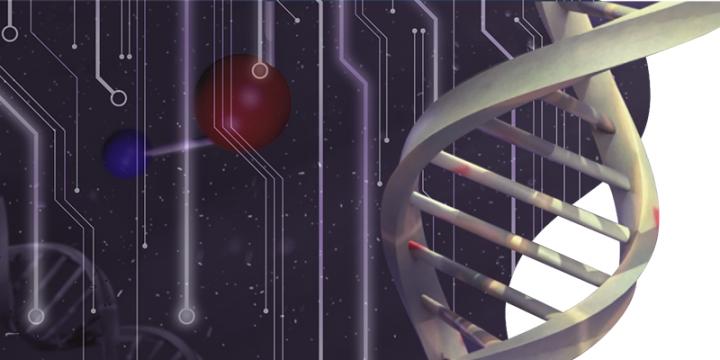Illustration shows the marriage of DNA nanotechnology and bioelectronics. Courtesy of EatFishDesign
A new and quicker method of diagnosing diseases in patients has been created by researchers at the University of Leeds.
The team has developed a system of examining individual molecules to detect the presence of disease in blood.
The molecules -- known as biomarkers -- are currently collected in their billions -- if not trillions -- in order to create a detectable signal of a disease.
The new system, which has already been used to detect a protein linked to cystic fibrosis, can compile a detectable signal from just a few biomarkers, and can be done in just a few minutes.
Although in its infancy, the new process could, in theory, speed up coronavirus testing and provide accurate results.
Dr. Mukhil Raveendran, the lead researcher of the project said: "One of the main advantages is the minimal sample needed.
"We are able to isolate individual molecules from small samples to identify specific illnesses. The process is very quick, and takes just minutes to provide results."
The new method involves using DNA origami - a nanoscale technique that involves folding DNA into specific shapes.
The DNA shapes are then used to capture biomarkers, which are indicators of particular diseases.
Raveendran said, "The captured biomarkers are then read with nanopores and we can do this one molecule at a time. By coupling DNA origami and nanopores we are able to quantitatively detect disease biomarkers with single molecule sensitivity."
The group, headed by professor Christoph Wälti at Leeds' School of Electronic and Electrical Engineering, is working to adapt the technology to enable the detection of a range of illnesses, including coronavirus (COVID-19).
By modifying the DNA origami to capture COVID-19 molecules, the researchers are aiming to detect the proteins that the coronavirus uses to invade human cells.
Dr. Paolo Actis, University Academic Fellow and co-supervisor of the project, said: "We have already demonstrated the detection of an inflammation marker called C-reactive protein (important for the management of many diseases including cystic fibrosis) in diluted serum. Sensitive detection of biomarkers is important for diagnosis and for disease management. Our read-out is entirely electrical so it can be miniaturized, enabling point-of-care detection."
The research, being carried out at Leeds' Bragg Centre for Materials Research, is in part funded by the Medical Research Council.
The findings, Rational design of DNA nanostructures for single molecule biosensing, were published Sept. 1, 2020 in Nature Communications.
Source: University of Leeds

Be the first to comment on "Scientists Develop New Method of Detecting Illnesses Including COVID-19 and Cystic Fibrosis"